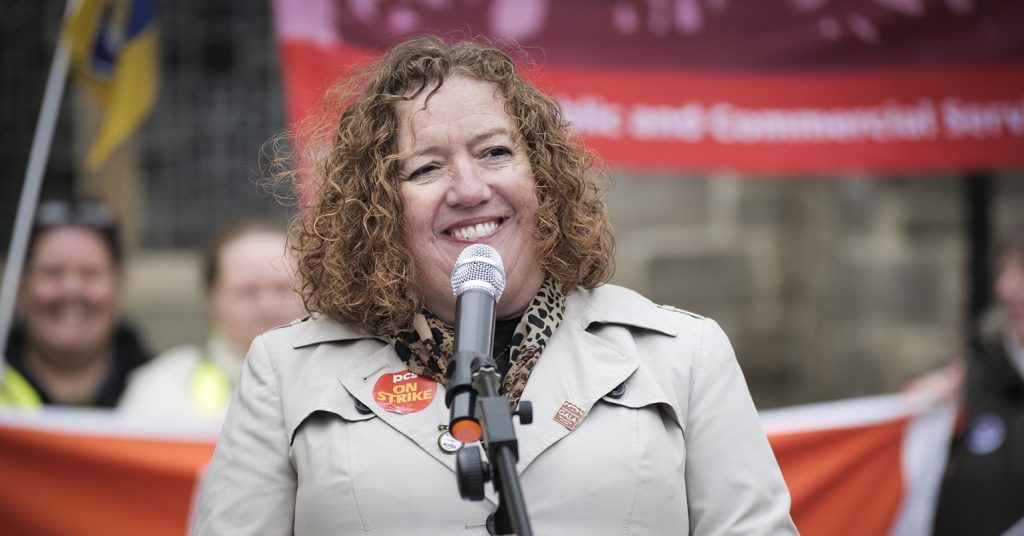PCS to back anti-cuts candidates
The Public and Commercial Services Union has announced it will back anti-cuts candidates in future national elections. Whilst local FBU branches have in the past backed Green candidates, this is believed to be the first time a union not affiliated to the Labour Party has adopted a national strategy for election campaigns.
Which candidates the PCS is likely to support is not yet clear, they make clear that they will consider supporting MPs who have consistently backed them in their campaigns; and local anti-cuts candidates in by-elections or in the seats of government ministers.
It is not yet clear if the PCS would count Green candidates, though Mark Serworta, General Secretary of the PCS has said in the past that he has voted for The Green Party, as well as for other parties to the left of Labour, and Caroline Lucas has consistantly worked with the PCS and supported their strikes since being elected an MP.
Full text of the PCS announcement:
Our campaigning against cuts and for the alternative to austerity has received a boost with an historic vote in favour of supporting candidates in national elections.
In what is a first for a union not affiliated to the Labour party, the 78.9% yes vote comes as we face unprecedented cuts to jobs, pay and pensions to pay for economic problems caused by the greed and recklessness of the banks, and a lack of political will to rein them in.
While trade unions have funded political candidates and parties for more than a hundred years, this result shows a clear desire for a political alternative to a consensus that means any opposition too often fails to properly challenge these cuts, or is relegated to being “a critical friend” of ministers’ plans to slash £28 billion in welfare support to the unemployed, sick and disabled.
In the same ballot almost 81% voted to endorse our wider political campaigning.
With the government making our economic situation worse and causing misery in our communities, we will now press election candidates even harder to make a stand against cuts.
Where they do not, and it helps our campaigns to defend our jobs and the public services we all rely on, we will consider supporting candidates or working with others to stand a candidate in national elections.
Examples might include backing anti-cuts candidates or targeting prominent government ministers whose main opponents are failing to campaign against their cuts.
Who gets support?
- In a parliamentary by-election, where unions and other groups have campaigned against the closure of local public services, which none of the candidates from the major political parties is opposing, we might decide to swing behind a local anti-cuts candidate
- Working with other union members and community groups, we could consider supporting or standing an anti-cuts candidate in a general election against a prominent government minister, if none of the candidates from the main parties opposes cuts the minister is responsible for making.
- Where an MP is standing for re-election who has worked tirelessly on behalf of our members, supported our campaigns, joined us on picket lines and been a strong voice for the alternative to cuts, we might call for them to be backed in recognition of their support.
PCS general secretary Mark Serwotka said: “This is an historic vote giving us another weapon in our fight against cuts and for the alternative to austerity.
“It will allow us to directly challenge the Westminster cuts consensus that is making scapegoats of public sector workers, the unemployed, pensioners and students, and destroying our communities.
“We know austerity isn’t working and we know there is an alternative based on investment in decent public services, tackling the tax dodgers and redistributing our nation’s wealth to the millions instead of the millionaires.”
Timescale and background
- PCS members voted in 2005 to set up a political fund for campaigning during election times
- In 2007 we ran our first Make Your Vote Count campaign, asking local election candidates where they stood on key issues and publishing responses to members in advance of polling day
- Since then we have organised MYVC campaigns during all types of elections – general, local, Scottish parliamentary, Welsh and Northern Ireland assembly, and European
- Following a decision at our annual conference in 2009 branches were consulted on the principle of supporting election candidates, and a majority backed the idea. A number of questions were raised about how it would work in practice, so following a decision at 2010’s annual conference a second consultation was held
- The results of this were reported to conference in 2011 and a motion passed endorsing the plan and calling for a full membership ballot





Leave a Reply